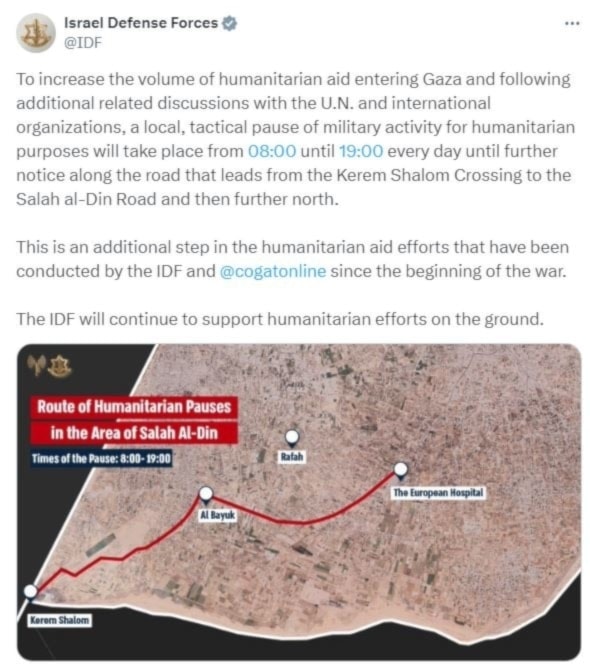The deepening divide within “Israel” is becoming increasingly apparent as Israeli Prime Minister Benjamin Netanyahu hints at schism with the Israeli military. Netanyahu’s statement, “Israel is a country with an army, not an army with a country,” underscores the growing tensions and disagreements between the government and military leadership. This schism threatens to tear “Israel” apart, bringing to light the challenges faced by political and military establishments amid the entity’s entanglement in a multi-front war with varying intensities.
This comes shortly after the Israeli occupation’s military command announced that it would implement a daily “tactical pause of military activity” in parts of the southern Gaza Strip during daylight hours to allegedly facilitate the delivery of aid.
Israeli occupation forces (IOF) currently occupy and control every crossing into the Gaza Strip, including the Rafah border crossing between Palestine and Egypt. This, alongside restrictions implemented by brutal force, has hindered aid delivery processes into the besieged territory.
The occupation’s military said that “a local, tactical pause of military activity for humanitarian purposes will take place from 08:00 until 19:00 every day until further notice along the road that leads from the Kerem Shalom Crossing to the Salah al-Din Road and then northwards.”

Infuriated by the decision, Netanyahu stated, “We have a country with an army, not an army with a country.”
“In order to achieve the elimination of Hamas, I have made decisions that aren’t always accepted by the military echelon,” he reportedly added during the meeting.
In the same context, Police Minister Itamar Ben-Gvir says that whoever decided on such a policy is a “fool who should not stay in his position.”
“Unfortunately, this move was not brought before the cabinet and is contrary to its decisions. It’s time to get out of the [outdated pre-October 7 security] concept and stop the crazy and delusional approach that only brings us more dead and fallen,” he said in a statement.
What does the announcement entail?
The Salah al-Din Road cuts across the cities of the Gaza Strip, linking the north to the south, passing through Rafah, and ends at a secondary crossing used for commercial trade between Palestine and Egypt, dubbed the Salah al-Din Gate.
On the other hand, what was described as the Kerem Shalom Crossing is the Israeli-controlled Karem Abu Salem Crossing, which is located on the southern end of the separation line between the Gaza Strip and Israeli-occupied ’48 Palestinian territories.
This crossing and surrounding facilities have been integral to the Israeli war on Gaza, especially in its later stages. The area has served as a checkpoint for most of the aid entering the besieged territory and a military base for occupation forces readying up to invade the southernmost city of Rafah.
‘Israel’ is starving children to death in Gaza
It is crucial to note that the area specified in the announcement does not include the hotspots of the Israeli invasion and aggressions in the Gaza Strip.
Currently, most of the Israeli military attacks are concentrated in the southwestern region of Rafah, through the Tel al-Sultan neighborhood, which does not correspond to the area encompassed in the decision.
Less intense attacks have also been launched into the al-Zaytoun neighborhood in Gaza City, which similarly is not included among the territories encompassed in the pause.
Israeli authorities allegedly took the decision as part of efforts to “increase the volumes of humanitarian aid entering the Gaza Strip” following discussions with the United Nations and other entities.
Another important point worth examining is that the announcement does not refer to the Rafah border crossing, meaning that according to the official announcement, the main gateway into the Gaza Strip will remain restricted.
Israeli forces suffer heavy losses on Saturday
However, Sunday’s announcement comes against the backdrop of attacks conducted by the Palestinian Resistance across the Gaza Strip against IOF positions.
The attacks, namely one in southwestern Rafah’s Tell al-Sultan neighborhood and one in Gaza City’s al-Zaytoun neighborhood, have reportedly killed 11 Israeli troops.
So far, the Israeli command has admitted to eight officers and soldiers killed on Saturday, with further announcement of the names and positions of the troops likely to follow soon. In the Palestinian Resistance’s operations, two combat officers, including the deputy commander of a company in the 401st Armored Brigade’s 601st Combat Engineering Battalion, were killed.
The other officer served in the 8th Armored Brigade’s 129th Battalion and was killed in an attack that also eliminated another Israeli soldier and seriously injured two others.
Sunna Files Free Newsletter - اشترك في جريدتنا المجانية
Stay updated with our latest reports, news, designs, and more by subscribing to our newsletter! Delivered straight to your inbox twice a month, our newsletter keeps you in the loop with the most important updates from our website












